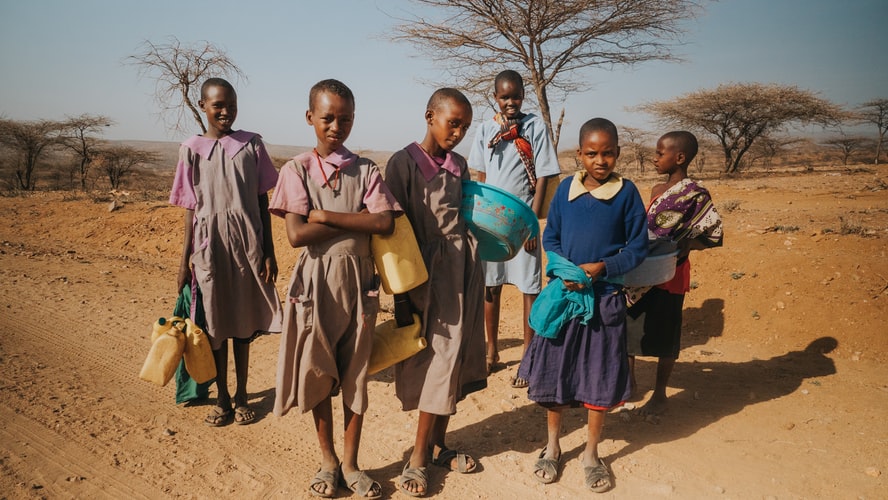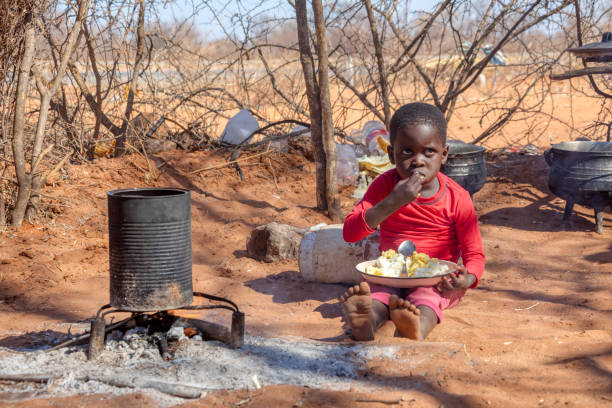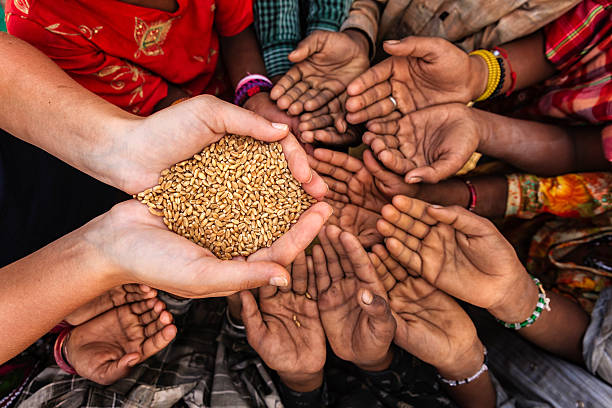The African continent has been subjected to states of famine and poverty for extended periods over the last few decades. Due to a dangerous combination of low-income and precarious public funding, the scarcity of food and rising levels of malnutrition have become cyclical realities in many states. According to a World Vision report, as of 2019, 234 million Sub-Saharan Africans have fallen victim to severe malnutrition and nearly 20% of the African population was experiencing hunger. As the Covid-19 pandemic continues, this number has seen an immense and rapid increase – putting many places in Africa in a state of humanitarian emergency.
Rise in Food Insecurity
“Food is the moral right of all who are born into this world.”
Norman Borlaug
With a population of over 1.2 billion people and insufficient funds to keep up with the needs of rapidly developing economies, Africa has already faced a wide variety of challenges. But throw in the added financial stress of the pandemic and the continent has an urgent crisis to contend with. As of 2021, over 100 million people are facing colossal levels of food insecurity – a number is set to increase in the months to come. The UN is describing this year as “the worst humanitarian crisis year since the beginning of the United Nations”, with there being a 40% increase in humanitarian assistance since the beginning of 2020. These numbers present as a grim prediction for the future months.

The UN’s Response
While the UN created specialist sub-organizations – such as the World Food Programme (WFP), tasked with battling world hunger – long before the pandemic struck, this issue remains a prevalent threat to human security today, especially across Africa. Recent reports claim that there has been an uptick in food scarcity due to violence within the region of Congo this year. Additionally, over 1.7 million people in the provinces of Afar, Tigray, and Amhara, belonging to the nation of Ethiopia are currently facing a massive hunger crisis as well. Moreover, due to the humanitarian wage gap, by which local staff has received comparatively less funding during 2020, there has been an inability to provide sufficient funds or resources to respond to worsening conditions on the ground. This has led to evident disruptions within local supply chains – related to both transportation and financing – resulting in a higher risk of maintained food insecurity. Indeed, with the effects of COVID-19 remaining heightened throughout the years 2020-2021, it is expected that the African continent could encounter an even steeper food shortage situation – potentially affecting more than 20 percent of its population – that is, about 272 million people.
In response to this situation, the UN is scaling its efforts. During the Food Systems Summit this year, the UN hopes to create new sustainable models to minimize food scarcity – especially for the African and Middle Eastern regions – while actively trying its utmost to reduce negative conditions in the most vulnerable communities across these continents through the work of the WFP and other related programs. This work seeks to maintain its promise of eventually achieving zero world hunger – one of the prime Sustainable Development Goals. Accordingly, programs such as the WFP and the UN in general actively call for renewed commitment from member states and individuals alike in advancing food security.
Joining Hands to End World Hunger
Organizations such as ‘World Vision’ and ‘Action Against Hunger’ are stepping up by providing emergency aid and long-term relief through food assistance, water sanitation, and land rehabilitation for better harvests. They have also provided funding opportunities through child sponsorship programs in Ethiopia and Kenya – enabling children to have access to better educational material and gain technical skills. Furthermore, they have administered drought-resistant seeds and training for local farmers as well. World Vision has also implemented an ‘Emergency food in Africa’ Fund that allows patrons to donate to provide care to hungry children and their families. Similarly, organizations such as the Red Cross Red Crescent National Society have been able to assist over 4.3 million locals by providing clean food and in-kind assistance as well. The UN Food Systems Summit, which is a subsidiary of the UN Food Program, has developed The Africa Green Revolution Forum Summit which will be used as leverage to elevate African voices to further identify immediate actions and accelerate the partnerships towards a more inclusive agricultural system within the continent.
Apart from major organizations such as those mentioned above, there are other volunteer-based initiatives that are conducting community outreach programs for this purpose as well. MercyTree International Foundation is one such organization. This foundation is currently conducting a food distribution program, called Feed Africa COVID-19 Program, where rations such as rice and other condiments are safely packaged and distributed to the communities residing in the regions of Nneano and Alaiyi in Africa. They successfully managed to provide 10kg bags of rice to 50 widows in one community, while over 150 families were grateful receivers of rations in the second community.
As organizations such as the UN and programs such as the WFP are currently contributing towards this cause in every way possible, they are still in need of support to further carry out their operations. For example, currently, over 100 trucks, carrying 3,500 metric tons of food supplies and other life-saving cargo, belonging to a WFP convoy entered the region of Tigray this year at the beginning of September. Though they managed to reach a certain amount of people through this initiative, WFP states that they need the same amount of supplies coming in every day to meet the demands of the residents and avert the risk of famine. Accordingly, they humbly request the public and any generous donors or organizations to kindly donate or volunteer towards this cause and help the current hunger crisis.
All in all, volunteer organizations such as these have reached as many as 1.96 million people all over Africa, providing them with clean food and water. The power of volunteerism can undoubtedly be seen from these acts of genuine kindness, and through such initiatives, there is hope that world hunger can be eradicated in the near future.

IVolunteer International is a 501(c)3 tech-nonprofit registered in the United States with operations worldwide. Using a location-based mobile application, we mobilize volunteers to take action in their local communities. Our vision is creating 7-billion volunteers. We are an internationally recognized nonprofit organization and is also a Civil Society Associated with the United Nations Department of Global Communications. Visit our profiles on Guidestar, Greatnonprofits, and FastForward.


